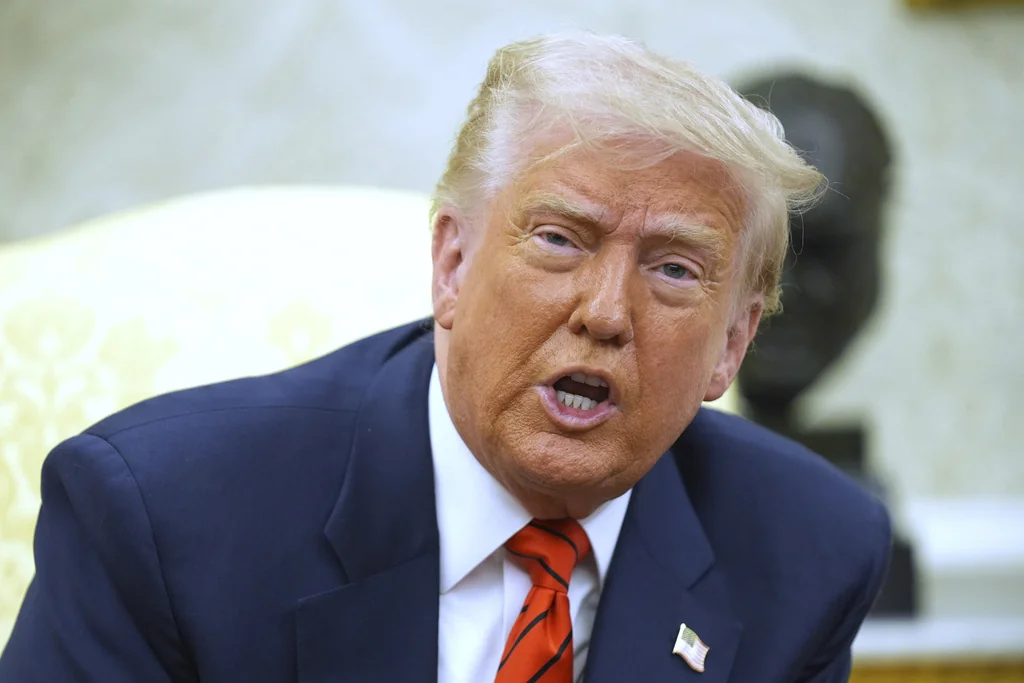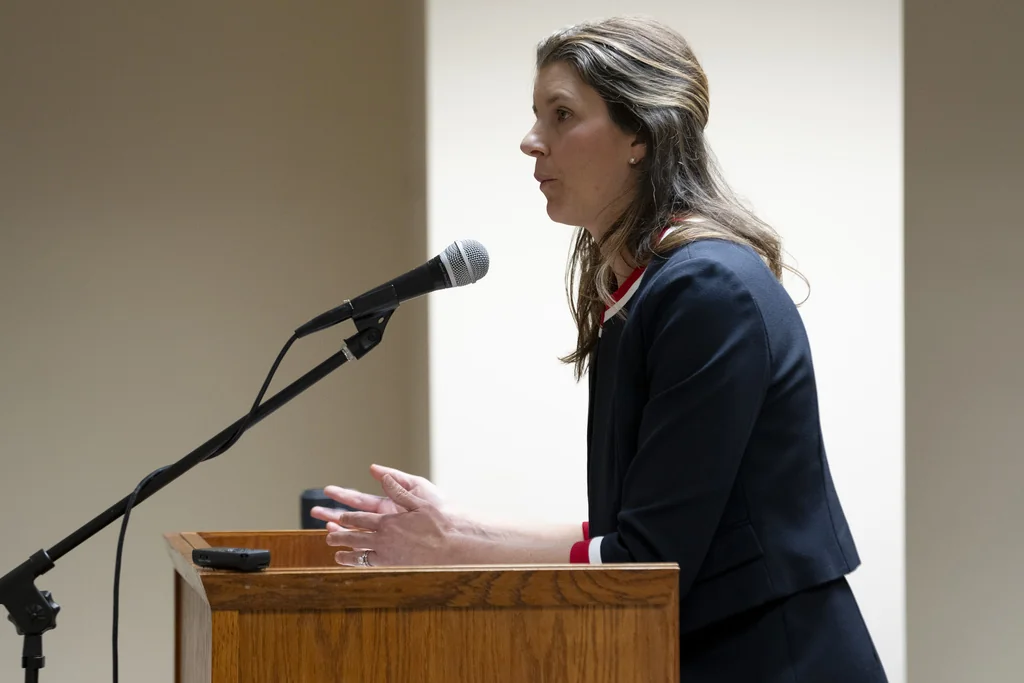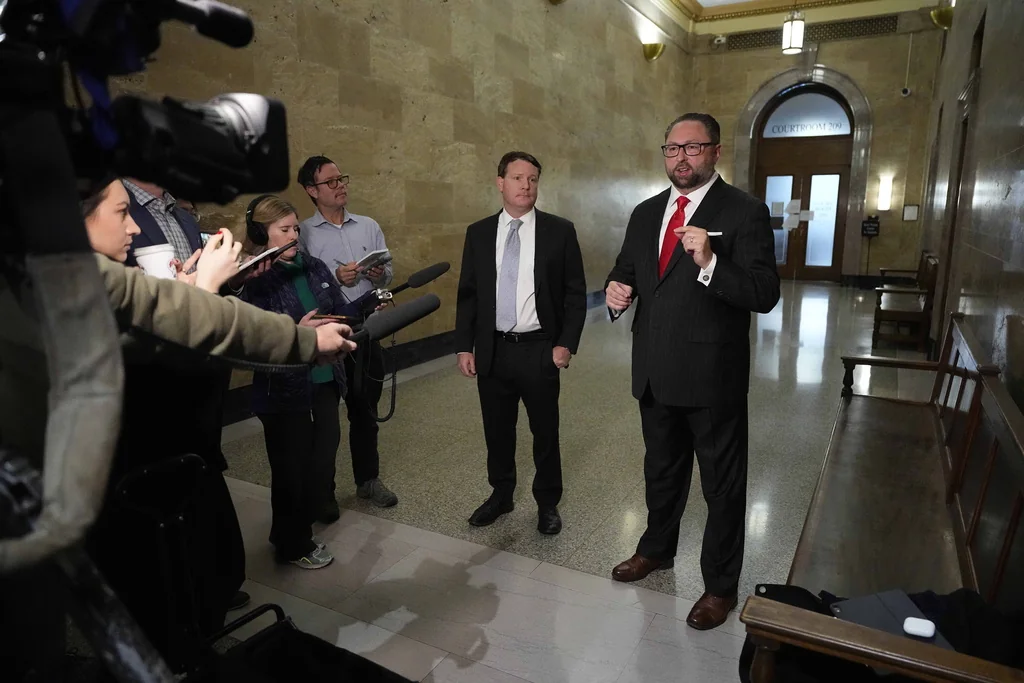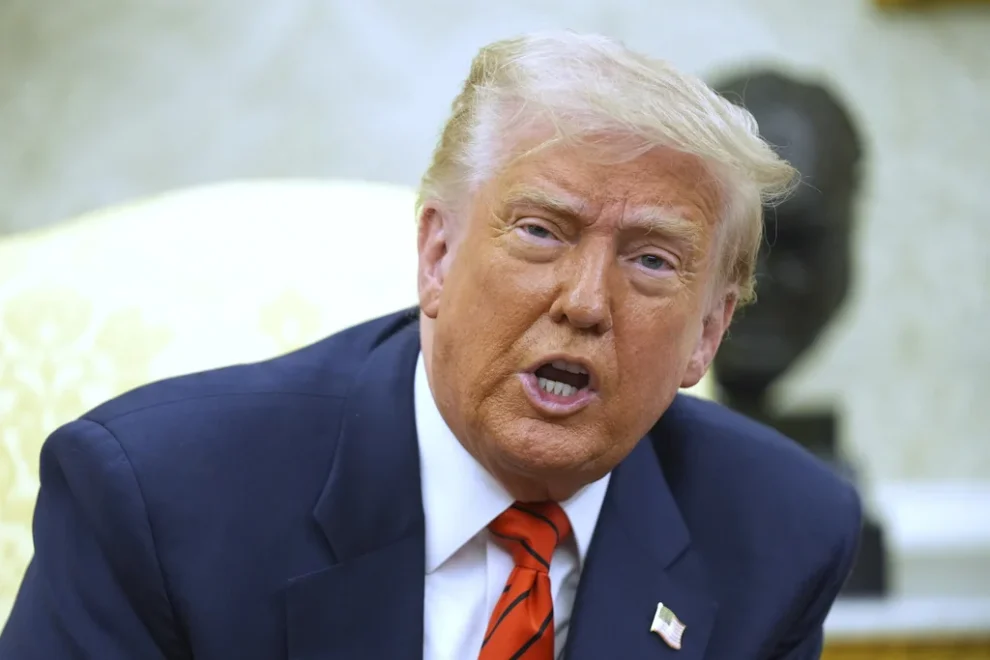President Donald Trump is entering his second term facing a starkly different judicial landscape after transforming the federal judiciary in his first term — but with no less ambition to leave his mark.
On Thursday, Trump announced the first judicial nominee of his second term: Whitney Hermandorfer, a top lawyer in the Tennessee attorney general’s office, who Trump tapped for the U.S. Court of Appeals for the 6th Circuit. Then, on Tuesday, he raised the number to five with the announcement of three federal district court nominees for the state of Missouri and a nominee to the Superior Court for the District of Columbia.

Praising Hermandorfer as “a Fighter who will inspire confidence in our Legal System,” Trump signaled that, despite moving more slowly to get started than in 2017, his push to add judges is now ramping up.
“We’re putting ’em in rapidly,” Trump told reporters on Air Force One Sunday. “We’re going to get very good ones.”
President Donald Trump will nominate federal judges “rapidly,” he told @DailySignal
“We’re putting them in rapidly and trying to get very good ones, but we need judges that are not going to be demanding trials for every single illegal immigrant." https://t.co/738k3z9Di9 pic.twitter.com/czexuA2cFZ
— Elizabeth Troutman Mitchell (@TheElizMitchell) May 5, 2025
The reality on the ground, however, is tougher this time around. Unlike his last term, when Trump had already settled on nominating Justice Neil Gorsuch to replace the late Antonin Scalia by his first day in office, this time, Trump waited nearly three months into his second term to announce his first federal judicial nominee.
During Trump’s first term in 2017, he inherited a golden opportunity: Senate Republicans had held the line against dozens of Obama’s judicial picks with the help of then-Senate Majority Leader Mitch McConnell, leaving more than 140 federal court seats open for a conservative president to fill.
The president’s slow walk on judicial nominations this time has come against the backdrop of his legacy-defining achievement of reshaping the federal judiciary during his first term. He has also expressed frustration with a growing number of judges blocking several of his key agenda items since January. More recently, a Trump-appointed judge in Texas even ruled against him on his invocation of the wartime Alien Enemies Act to deport Venezuelan gangs to a Salvadoran prison.
As it stands, Trump has inherited just over 40 active vacancies, or about 61 when counting expected future retirements, after former President Joe Biden and a Democratic Senate pushed through 235 judicial confirmations before leaving office. The Biden administration barely topped Trump’s first-term record of 234, which included three nominees to the Supreme Court. Biden scored just one high court pick with the confirmation of Justice Ketanji Brown Jackson.
Trump’s current nominations are “just a continuation” of his first term’s progress, Robert Luther III, a professor at the Antonin Scalia Law School and former White House associate counsel who helped oversee judicial selection under Trump’s first-term White House counsel Don McGahn, told the Washington Examiner. Building on that success “was always the plan,” Luther said.
“Nobody that actually knows what they’re talking about has ever taken the position that the judges are going to be materially different this time,” Luther added. “[Hermandorfer] looks just like the kind of person we would have picked. If the same people were there this time, we would have picked her.”
Michael A. Fragoso, a lawyer in Washington, D.C., and a fellow at the Ethics and Public Policy Center, wrote for the National Review that if Hermandorfer’s selection is a sign of what is to come, it should “put to rest the hand-wringing on the right about how Trump’s supposed falling out with the Federalist Society means that he will be picking cronies and cranks.”

But in the months leading up to Trump’s first judicial nomination this term, there was much speculation about what his advisers would do differently compared to the first time around, when many of Trump’s judicial nominations — including the selection of Justices Neil Gorsuch, Brett Kavanaugh, and Amy Coney Barrett — were selected in part with the help of then-Federalist Society executive vice president Leonard Leo.
Early reports in 2024 indicated Leo would have little to no involvement in the process, which left open a larger question about how Trump would navigate his judicial nominations.
Driving Trump’s judicial strategy this time around is a new team of senior aides, including White House chief of staff Susie Wiles, White House counsel Dave Warrington, and deputy counsel Steve Kenny. From the outside, they are joined by at least one conservative group, the Article III Project, a judicial advocacy organization founded by Mike Davis, former chief counsel for nominations to Senate Judiciary Chairman Chuck Grassley (R-IA).

Davis confirmed to the Washington Examiner that his group assisted in recommending Hermandorfer to the Trump White House, a role that he boasted enthusiastic interest in during the 2024 campaign season.
“Trump will look beyond the garden-variety Federalist Society choices and install a new generation of judicial titans who will change the landscape for generations to come in line with our Founders’ intent,” Davis wrote in an op-ed last week praising Trump’s first nomination, suggesting Trump’s second-term judicial selections would channel “bold and fearless” to uphold the Constitution.
Hermandorfer, a Princeton graduate and former co-captain of the university’s women’s basketball team who has participated in Federalist Society events, has an elite conservative pedigree: clerkships with Justices Samuel Alito and Amy Coney Barrett, a prior clerkship under Brett Kavanaugh on the District of Columbia Circuit, and leadership roles in Tennessee’s top legal fights, including defending the state’s abortion ban and opposing Biden-era transgender student protections.
Missouri, a deep-red MAGA stronghold, is fueling several of Trump’s latest judicial nominees, with the strong support of Sen. Josh Hawley (R), who previously hired Divine as his general counsel in the Senate. The state attorney general’s office, led by Andrew Bailey, has become a central legal player on the right, driving major fights over abortion, transgender policies, and federal authority. U.S. Solicitor General D. John Sauer, previously Missouri’s solicitor general, underscores the state’s prominence in shaping the national conservative legal agenda.
Among the nominees Trump announced Tuesday: Joshua Divine, Missouri’s solicitor general and former clerk to Justice Clarence Thomas; Zachary Bluestone, appellate chief and violent crimes prosecutor in the U.S. Attorney’s Office for the Eastern District of Missouri; Maria Lanahan, principal deputy solicitor general in the Missouri AG’s office and a University of Chicago Law graduate; and Judge Cristian Stevens of the Missouri Court of Appeals, a former assistant U.S. attorney and Eighth Circuit law clerk.
Beyond Missouri, Trump has nominated Edward O’Connell, chief of staff and deputy general counsel at the Office of the Inspector General for the U.S. Nuclear Regulatory Commission, to serve as associate judge on the Superior Court of the District of Columbia. O’Connell previously spent nearly two decades as a prosecutor in the U.S. Attorney’s Office for D.C., handling homicides, felony crimes, and organized crime cases.
Brian D. Ginsberg, a partner at Harris Beach Murtha and a seasoned federal appellate lawyer, told the Washington Examiner that Trump’s second-term judicial approach could open new possibilities.
“Now that President Trump will presumably not be attempting to obtain further reelection, it stands to reason that he may feel freer to consider, and ultimately nominate, a wider or different range of people to the federal bench than he did during his first time,” Ginsberg said. “He may well try, and be able to, put his unique stamp on the judiciary in a more pronounced way than before.”
Trump has several chances to shape appellate and district courts, with the 6th Circuit being one that he can truly reshape for decades to come. Out of the 16 total seats on the 6th Circuit, seven were filled by Democratic presidents while nine were named by Republican presidents. Hermandorfer’s confirmation would bring that to 10 Republican appointees.
Luther noted that the administration is likely to prioritize judicial picks in red states with two Republican senators such as Tennessee, Texas, Missouri, and Florida, where GOP senators and the White House can easily align on nominees, before wading into more contentious blue-state vacancies.
“Of the six circuit court vacancies right now, Whitney fills one of them, and that’s a Democrat pickup,” Luther said, noting she would replace Judge Jane Stranch, an appointee of former President Barack Obama who announced her senior status last year, if confirmed. “Two of the other five are also Democrat pickups, in New Jersey and Maine, and then the rest will be red-to-red in California, Wisconsin, and Delaware.”
Sen. Thom Tillis (R-NC) a member of the Senate Judiciary Committee, told the Washington Examiner on Tuesday that Trump’s opportunities may actually be stronger than they were in his first term in certain states, thanks to vacancies preserved during the Biden years, and due to the Senate majority the GOP gained after the 2024 election.
North Carolina currently has four district court vacancies, though the 4th Circuit remains fully staffed after Judge James Wynn Jr., an Obama appointee, reversed his planned retirement last year after Biden was unable to fill a replacement in time. Of the 4th Circuit’s 15 total seats, seven are occupied by Republican presidential appointees and eight are filled by Democratic presidents.
“We can still get a lot of work done, and that’s based on the openings that we have today,” Tillis said. “North Carolina, because I was able to keep seats open either through the blue slip or through the procedure with the circuit judge, we’re going to have more nominees in this Trump — just in our state and hopefully the 4th Circuit — than we did in this first term. So I’m happy about at least my circuit and my state.”
Other easy states for Republicans to prioritize include Florida, which has four seats ready to be filled, and Texas, which has seven district court vacancies. Missouri has five district court vacancies and Tennessee has one.
While the available seats are fewer, conservative activists are banking on the possibility that Trump’s aggressive push will encourage older Republican-appointed judges to retire and make room for younger, long-term replacements.
TRUMP NOMINATES FIRST FEDERAL JUDGE OF HIS SECOND TERM
For Trump, even with a thinner judicial map, the courts remain one of his most potent tools to reshape the legal landscape for decades — a legacy project that, in addition to confirming U.S. attorneys across the country, has moved to the forefront of his political agenda.
David Sivak contributed to this report.
























